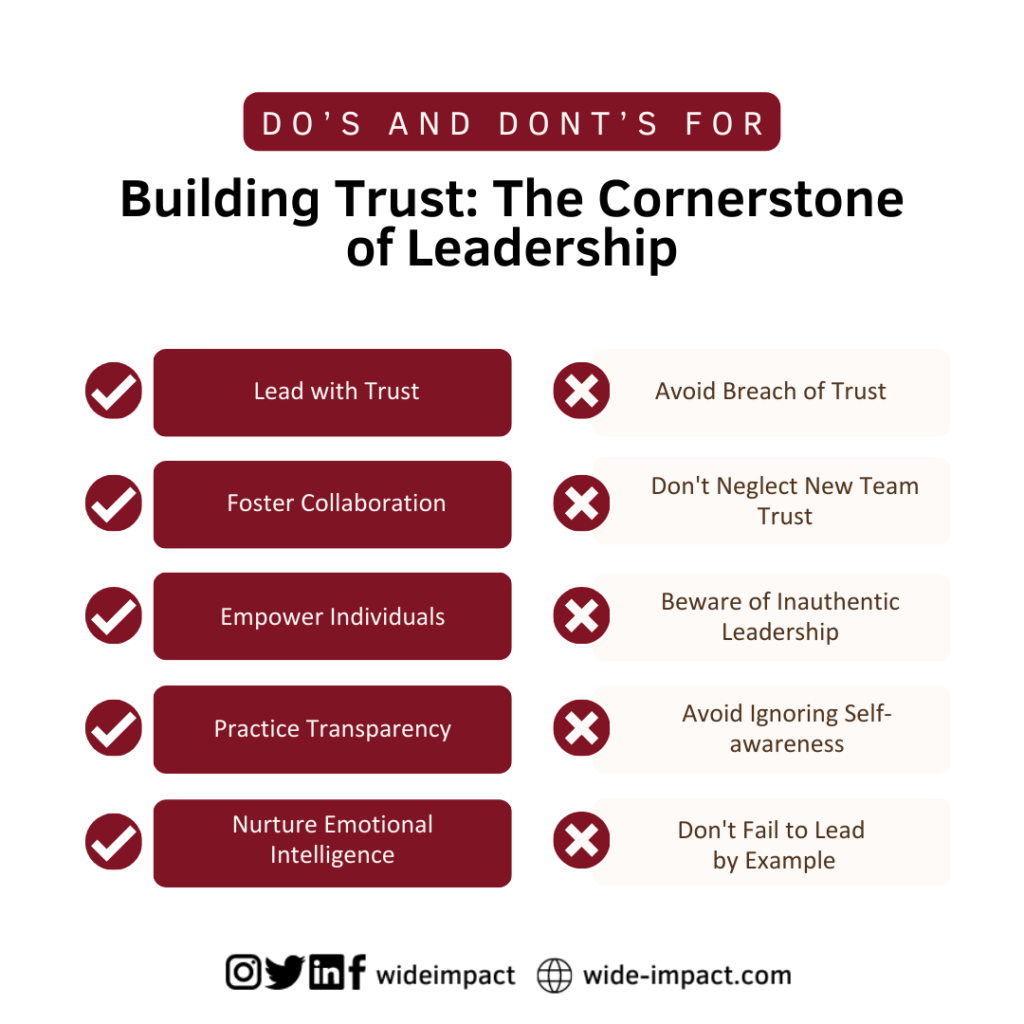By Dr. Salam Slim Sadek
Trust is the cornerstone of effective leadership. It acts as the glue that holds teams together, fosters collaboration, and enables individuals to reach their full potential. Without trust, leaders struggle to inspire and motivate their team members, ultimately delaying their own success.
Trust is a fundamental aspect of any relationship, and it holds immense importance in the context of leadership. But what exactly is trust? Trust can be defined as a firm belief in the reliability, truth, or ability of someone or something. It is the foundation upon which strong relationships are built.

trust matters because it creates an environment where team members feel safe to take risks, share their ideas openly, and collaborate effectively. When leaders establish trust with their team members, it fosters a sense of belonging and loyalty within the group.
Trust also plays a crucial role in promoting open communication within teams. When team members trust their leader to act with integrity and honesty, they are more likely to express their concerns and provide feedback without fear of judgment or negative repercussions.
Furthermore, trust enables leaders to delegate tasks confidently and empower their team members. When there is mutual trust between a leader and their team, individuals feel valued and capable of taking on responsibilities that contribute to overall success.
Without trust, leaders may struggle to build cohesive teams or achieve desired outcomes. A lack of trust breeds skepticism among team members who may become disengaged or resistant to change. This ultimately hampers progress and stifles innovation within an organization.
Trust in Leadership: Understanding Its Significance
To trust a leader is to have faith in their ability to successfully carry out their duties as a leader, considering their vital skill, character, and communication abilities. Leaders may build strong connections with their teams based on trust and respect by understanding the three elements of trust: Competence, Character, And Communication. In order to achieve organizational success while maintaining employee morale and motivation, trust is crucial. It serves as the foundation for cooperation, resilience, and development. To break it down further:
- Competence Trust: This pertains to having faith in a leader’s capabilities and expertise. When team members perceive their leader as possessing the knowledge and skills necessary for success, they are more inclined to trust their decisions and guidance.
- Character Trust: This revolves around believing in a leader’s integrity, ethics, and values. Leaders who consistently demonstrate honesty, transparency, and ethical behavior earn the respect and trust of those they lead.
- Communication Trust: This centers on open and honest communication between leaders and team members. When leaders cultivate an environment where ideas flow freely, concerns are promptly addressed, and feedback is genuinely valued, it fosters trust within the team.
The Role of Trust In Building Strong Relationships
Building strong connections, which are essential for every leadership job, relies heavily on trust. There are several benefits to a team that has built trust:
- Enhanced Team Productivity: When team members place their trust in both their leader and each other, they are more inclined to collaborate openly and take calculated risks. Consequently, this leads to heightened efficiency and a greater propensity for innovation within the group.
- Elevated Employee Engagement: When employees feel that their leaders trust them, they are more likely to exhibit motivation and commitment towards their tasks. This trust fosters a positive work environment that encourages individuals to perform at their highest potential.
- Improved Decision-Making: In an environment where trust prevails in both judgment and intentions, decisions can be reached more promptly and with greater confidence. This expedites progress towards achieving established goals.
- Effective Conflict Resolution: Trust enables open and honest communication, where differing opinions can be openly discussed without the fear of judgment or retaliation.
- Attraction and Retention of Top Talent: Organizations that have built a reputation for trustworthy leadership are more likely to draw in talented individuals who seek environments where they feel valued and have faith in the integrity of their leaders.
Key Principles For Building Trust:
- Leading By Example: It involves embodying the values and behaviors you expect from your team, fostering a culture of accountability and integrity. For example, a CEO who consistently arrives early, works diligently, and communicates transparently demonstrates commitment and dedication. This inspires employees to emulate the same work ethic and dedication to the organization’s mission, ultimately leading to a more motivated and productive workforce.
- Transparent Communication: It builds trust, promotes understanding, and strengthens relationships within organizations and communities. In a corporate setting, a leader who communicates the company’s financial challenges honestly with employees fosters a sense of shared responsibility. This transparency encourages employees to offer innovative solutions and engage in cost-saving initiatives, ultimately contributing to the organization’s resilience and success. In personal relationships, open and honest communication can resolve conflicts and build deeper connections, leading to more fulfilling interactions.
- Effective Communication: It involves clear, concise, and empathetic expression of thoughts and ideas, ensuring mutual understanding. Effective communicators listen actively, provide constructive feedback, and adapt their style to suit the audience, enhancing relationships and achieving desired outcomes. In a workplace, a manager who communicates clearly and listens actively to employees’ concerns fosters a collaborative environment. This leads to better problem-solving, increased employee morale, and improved overall performance within the team.
- Empathy And Emotional Intelligence: This enables individuals to understand and connect with others on a deeper level, fostering stronger relationships and effective communication. A leader with high emotional intelligence can empathize with their team members’ challenges and emotions. They actively listen and provide support, creating a more inclusive and harmonious work environment. This leads to improved morale and collaboration among team members, ultimately enhancing overall productivity and job satisfaction.
- Delegation: It empowers individuals, promotes efficiency, and allows leaders to focus on strategic matters. For instance, a manager may delegate project management tasks to a capable team member, freeing up their own time for high-level decision-making. This not only develops the skills and confidence of the team member but also ensures that work is distributed efficiently, contributing to the overall success of the team and organization.
- Trust-Building Strategies: These approaches involve open communication, reliability, and consistency, which help foster confidence and goodwill among individuals and groups. When you genuinely listen to others, validate their concerns, and respond empathetically, it creates a sense of trust. Additionally, fulfilling promises and delivering on commitments consistently reinforces trust in personal and professional interactions.
- Collaboration-Focused Environment: It encourages individuals to work together seamlessly, leveraging their collective strengths to achieve common goals. Such an environment promotes innovation, efficiency, and a sense of shared purpose. For example, in a tech startup, employees from different departments collaborate regularly to brainstorm ideas, share expertise, and develop new products. This collaborative spirit fosters creativity and allows the company to adapt quickly to market changes, leading to its success and growth.
Overcoming Trust Barriers
Trust is a delicate aspect of any relationship, including those within a leadership context. It is imperative for leaders to recognize and address common trust issues effectively. Here are key points:
- Breach of Trust: One prevalent trust issue occurs when trust is compromised due to actions or behavior. To rebuild trust, it demands time and effort. This process involves:
– Acknowledging the breach
– Taking responsibility
– Making amends through consistent actions that demonstrate reliability and integrity. - Building Trust with a New Team: Establishing trust with a newly formed team can be challenging. Leaders must:
– Create a safe environment for team members to express their thoughts and concerns.
– Set clear expectations from the outset to lay the foundation for trust-building. - Self-awareness: Self-awareness is crucial in overcoming trust barriers. Leaders must:
– Recognize their own strengths and weaknesses to understand how these traits affect others’ perceptions of them.
– Engage in self-reflection to identify areas for improvement and make necessary changes.
Leading by Example
Effective leadership centers on the practice of leading by example, which includes several critical factors:
- Authenticity: It involves staying true to oneself and openly expressing genuine thoughts, emotions, and actions. Authentic leaders cultivate trust within their teams.
- Character Trust: It reflects a leader’s integrity, honesty, and ethical behavior. Leaders who consistently exhibit these qualities in their interactions foster trust among team members.
- Role Modeling: Leaders serve as benchmarks for behavior and performance within their teams. Their actions carry more weight than their words. Demonstrating professionalism, respectfulness, and dedication inspires team members to emulate these traits.
- Fostering an Open Environment: When leaders lead by example through authenticity, character trust, and role modeling, they create an atmosphere where team members feel safe expressing themselves without fear of judgment or reprisal.
Top 5 FAQ about Building Trust: The Cornerstone of Leadership
- How long does it take to build trust in a team?
Building trust is not an overnight process; it takes time and consistent effort. The timeline for building trust can vary depending on the individuals involved and the specific circumstances. It requires open communication, consistency, and demonstration of integrity over an extended period. - What if I’ve made mistakes in the past that have damaged trust?
Rebuilding trust after a breach can be challenging but not impossible. It starts with acknowledging your mistakes, taking responsibility, and making amends where possible. Consistent actions that align with your words will help rebuild trust gradually. - How can I build trust with a new team?
Building trust with a new team requires intentional efforts to establish positive relationships from the start. Be transparent about your expectations, communicate openly and honestly, actively listen to their concerns, and demonstrate competence in your role. - Can you delegate tasks while still maintaining trust?
Delegation is essential for leadership development and building trusting relationships within teams. Effective delegation involves clearly communicating expectations, providing necessary resources or support, allowing autonomy within boundaries, and being available for guidance or feedback when needed. - Is self-awareness important in building trust as a leader?
Absolutely! Self-awareness allows leaders to understand their own strengths, weaknesses, values, biases and how they impact others’ perception of them as trustworthy individuals.
Remember that building trust is an ongoing journey rather than an endpoint – it requires continuous effort to maintain strong relationships built on mutual respect and reliability!
Trust is the foundation of any strong and effective leadership. Without trust, a leader cannot inspire and guide their team towards success. By understanding the essential elements of trust – honesty, transparency, reliability, and competence – leaders can cultivate strong relationships with their team members and foster a positive work culture. With trust at its core, an organization can achieve greater productivity, collaboration, and overall success.
As John C. Maxwell once said, “A man must be big enough to admit his mistakes, smart enough to profit from them, and strong enough to correct them.” Let us strive to be leaders who not only possess these qualities but also prioritize building trust in all aspects of our leadership journey.


